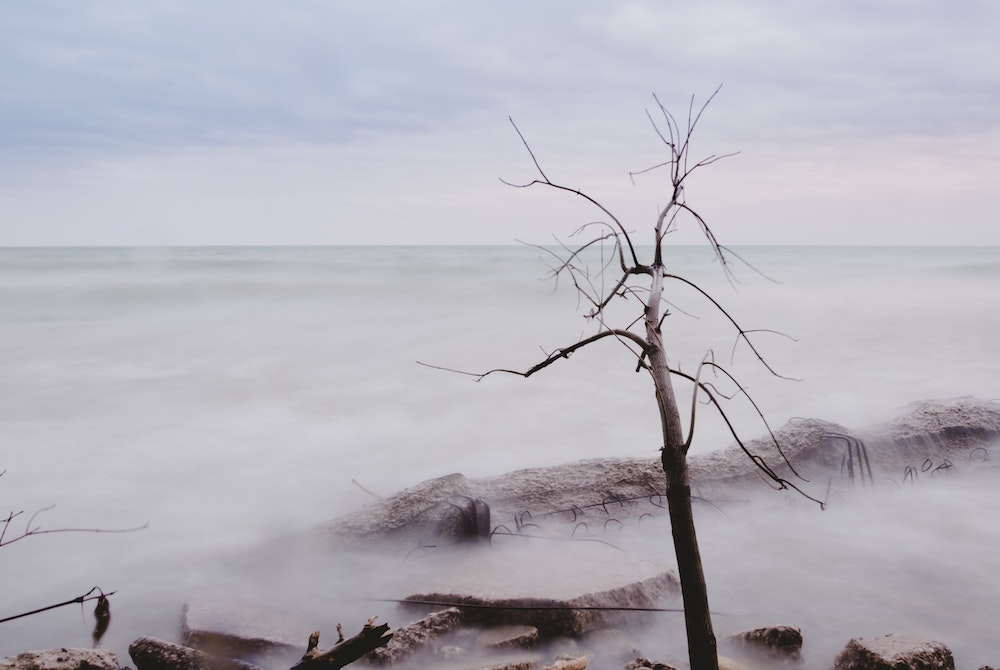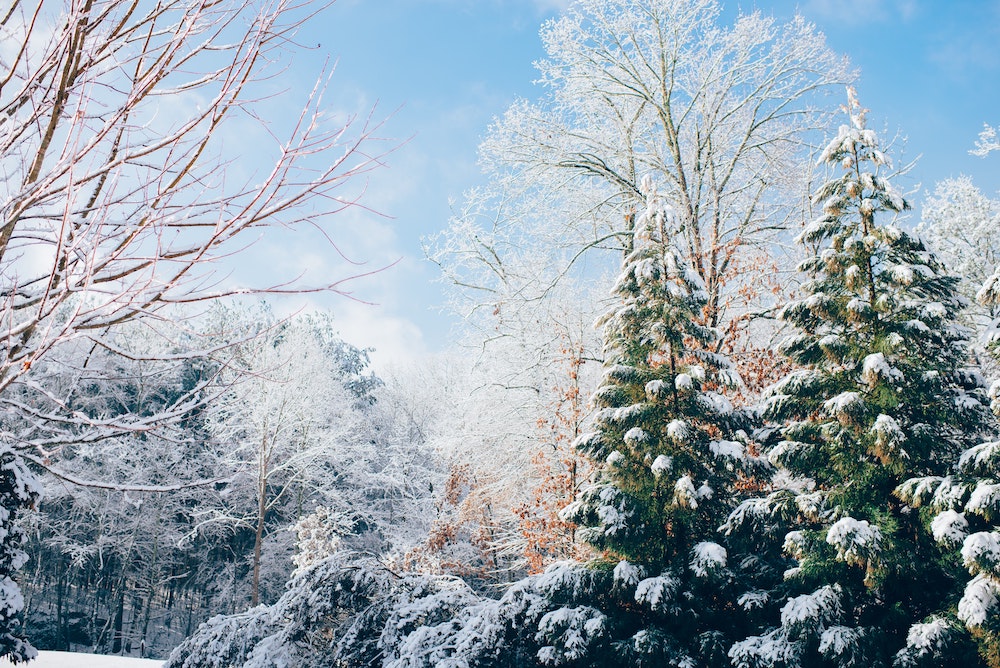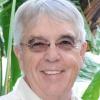
About mid- to late autumn the perma-cloud rolls in off Lake Michigan. Like a migrating fowl, it stays awhile before moving on. (Unsplash/Kayle Kaupanger)
About mid- to late autumn the perma-cloud rolls in off Lake Michigan. Like a migrating fowl, it stays awhile before moving on. Two, maybe three months. Sweeping across the lake, the cold north air births the phenomenon. It picks up heat and moisture from the lake, then rises to mix with the colder, dryer air. You can stand on the shore and watch the clouds form. Blankets of them.
I'm a north-country guy. Snow is beautiful. Cold is bracing. The perma-cloud, on the other hand, is annoying. OK, I'll say it: depressing. For me Seasonal Affective Disorder seems a real problem.
Still, the white season of short days has it charms, even under grey skies. Engagement abounds, even in our small town — concerts and film series at a nearby college, Tuesday night euchre and Friday morning mahjong, outings with friends at home or in restaurants and pubs, Sunday afternoon piano recital series and Friday noon "ROMEO" lunches (Retired Old Men Eating Out), gallery shows and book discussion groups.
The holidays boost winter's mood with their warm glow. The air of celebration. The rainbow of lights. Gift lists and shopping. Festive dinners and parties. The warmth of a Christmas liturgy. And the music. Always the music.
And family — Thanksgiving and/or Christmas with our family is sacred. Plain and simple.
Advertisement
Until another perma-cloud called COVID-19 cancelled most, compromised all. Especially for seniors such as my wife and me. Or for those of us with diminished immunity. The country will not likely lock down again, and vulnerable cohorts will need to practice extra caution, even when it means months of semi-isolation.
Unfortunately in limiting our exposure, we seniors put the squeeze on our lifeblood — social contact. The human desire for close and supportive relationships is strong in the hierarchy of needs, a need regularly tested among seniors as their once expanding circle of friends and acquaintances continually contracts. Now the frequent sadness of loss is compounded by the new stress of semi-isolation.
Be positive, I urge myself. The German novelist Herman Hesse writes in Siddharta, "I see whatever exists as good … everything has to be as it is, everything only requires my consent, only my willingness, my loving agreement, to be good for me, to do nothing but work for my benefit, to be unable to ever harm me."
That's a tall order. How do I give my "loving agreement" to the necessity of cancelling family Thanksgiving, passing up the chance for all 16 of us to gather? At age 79, such windows close fast.
How to cope? There are proven strategies for good mental health. Walk daily — aerobic exercise is a powerful antidote. Be intentional about staying connected even though it means navigating unfamiliar social media. Avoid doomscrolling, exposing ourselves to the constant drumbeat of despair. Be positive and pursue good news. Delve into Factfulness, a book that reminds us just how much better off most people in the world are than a century ago. What a revelation.
Be grateful. Always. I'm quick to remember our relative good fortune, our position of privilege. Any assent we make comes in the warmth of a nice home and an adequate table. Our children and grands are all adapting and coping well, with a minimum of loss. A 15-year-old granddaughter contracted COVID-19 but recovered quickly. A son-in-law works in the front line as a primary care doctor. Otherwise we do not have the exposure of a retirement community or essential workers who face the triple threat of physical closeness, low wages and inadequate health care. Unlike them, we don't face the daily threat of dissolving security.

(Unsplash/Ian Schneider)
Yet I think the good Hesse refers to promises something deeper, more enriching.
A longtime friend and author, Mary Craig, once wrote in The Last Freedom that in the moment of desolation "we become aware that strength is available for us if we choose to avail ourselves of it. Seizing hold of that strength, choosing to face an uncertain future with hope … is the one important freedom we have." The freedom to cultivate patience. The freedom to discover that strength.
Perhaps I will engage this freedom, find this strength, in the act of waiting. Waiting out the dual perma-clouds that darken our lives. It is, surprisingly enough, a spiritual practice. The French philosopher and resistance fighter Simone Weil tells us "Waiting patiently in expectation is the foundation of the spiritual life."
Henri Nouwen explores the idea of waiting in a talk he gave called "The Spirituality of Waiting" (condensed text version here). He says, "People who wait have received a promise that allows them to wait. They have received something that is at work in them, like a seed that has started to grow."
Zachariah and Elizabeth, Mary, Simeon and Anna all wait with that seed in their hearts says Nouwen — Zachariah and Elizabeth for news of a son, Mary for her child who will be called the Son of the Most High, and Simeon and Anna to hold the Messiah at the Presentation in the Temple. They are aware of possibility without understanding of what might be, for as Nouwen says the flowering of the seed is "far beyond their imaginings."
The Anglican priest W.H. Vanstone offers an additional perspective in The Stature of Waiting, what he calls a shift from the active to the passive. He uses the life of Jesus to explain. In Mark's Gospel, Jesus is the subject for most of his public life. He is active even when his enemies attack him. But when he is taken in Gethsemane, his life shifts to the passive. "It is now all about what is done to him, not what he did. … His inner state becomes silent," write Vanstone, as Jesus waits on his Father's will.
It's at the Last Supper in John's Gospel Jesus says his work is done. "The activity of the day yields to the passivity of the night, and working becomes waiting," writes Vanstone.
Should I live long enough and diminish far enough, waiting will be the end game. Activity will yield to passivity. Such will be hard — I've seen the struggle in the lives of friends already limited by age and illness — perhaps terrifying in a world that measures human worth and meaning by activity and achievement, even the slowed down activity of septuagenarians. Some practice during this pandemic may just help.
Herein lies the pandemic's invitation. Engage a lesson in waiting. Hope for the sun to return in time to dapple the snow and glisten the big lake's ice. Wait for the first false spring and the giddy rush to get outside to rake the late-dropping oak leaves. Wait for the encouraging warmth that will bring friends together in yards and parks. Wait for a vaccine and the all clear it will signal. Wait through the hierarchy of priorities for our turn.
Wait for Nouwen's seed to sprout in a world that the virus will change significantly. We may just exit this experience with a different way of being.
As I try to cultivate the strength in patience, as I hesitatingly engage passivity, I'll borrow an invitation from the poet Barbara Crooker:
…while these old
bones are still working, my darling,
let's dance.
Not the dance floor for many a month, but there's always the living room.




